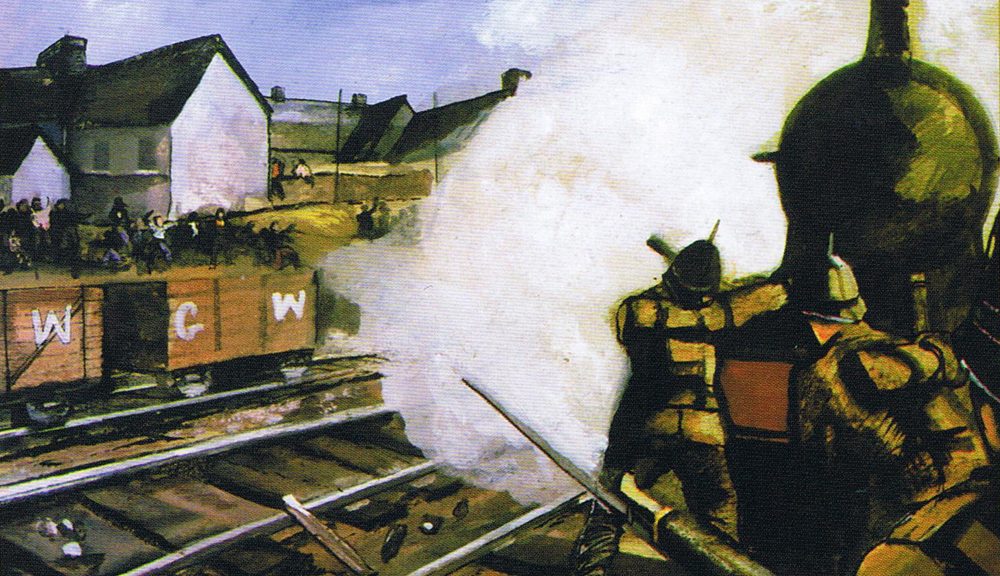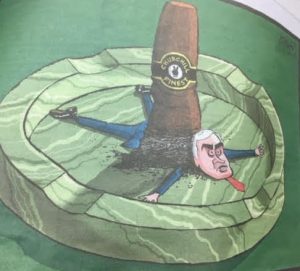
Churchill, Tonypandy and “Poundland Lenin”
Tonypandy, Wales is in the news again with fuzzy purveyors of history. On 13 February the Guardian headlined, “Winston Churchill was a villain, says John McDonnell.” (Mr. Donnell is Labour’s shadow Chancellor of the Exchequer in the House of Commons.)
“Villain — Tonypandy”
Mr. McDonnell’s swipe at Churchill was brief. Asked if he saw Churchill as a hero or villain, he replied: “Villain—Tonypandy.” The Guardian completed the drive-by assassination, not only by headlining the remark, but with an inaccurate rehash of the Tonypandy riots in 1910.
Sir Winston’s grandson, Sir Nicholas Soames, focused on McDonnell, calling him a “Poundland Lenin.” Maybe, but what about the Guardian? Ironically, at the time, the same newspaper had defended Churchill for his moderation.

There was one death at Tonypandy, but that occurred during the rioting and before Churchill was involved. However, troops did cause two to four deaths nine months later, during another strike at Llanelli. Quoting from my book, Winston Churchill, Myth and Reality, Chapter 8….
Rhondda Valley, 1910
For over a century the story has been part of socialist demonology. Churchill, as Home Secretary in 1910-11, “sent troops to attack striking coalminers” in the Rhondda Valley, Wales. In an otherwise generous tribute following Churchill’s death in 1965, Labour Prime Minister Harold Wilson found it necessary to remind Parliament of Sidney Street, Gallipoli, and “the sullen feet of marching men in Tonypandy.”
In concern over possible rioting during the Rhondda miners’ strike, Churchill met with Secretary of State for War Richard Haldane. They resolved to dispatch police constables, but no troops. Churchill declared the use of soldiers inappropriate in a civil disorder. He also promised the strikers an immediate Board of Trade inquiry into their grievances. He sent them this message:
[Your] best friends here are greatly distressed at the trouble which has broken out and will do their best to help [you] get fair treatment…. But rioting must cease at once so that the enquiry shall not be prejudicial and to prevent the credit of the Rhondda Valley being impaired. Confiding in the good sense of the Cambrian workmen we are holding back the soldiers for the present and sending police instead.
Lo the Poor Horses!
The Tory press attacked. The Times said that Churchill
hardly seems to understand that an acute crisis has arisen which needs decisive handling. The rosewater of conciliation is all very well in its place. But its place is not in face of a wild mob drunk with the desire of destruction. Men’s lives are in danger, not to mention the poor horses….
The Liberal press defended Churchill, praising his restraint. “The brave course was also the wise one,” wrote the Manchester Guardian:
One can imagine what would have happened if the soldiers instead of the policemen had come on the rioters while they were pillaging. Bayonets would have been used instead of truncheons… Instead of a score of cases for the hospital, there might have been as many for the mortuary.
Tonypandy, 1910
The decision to withhold troops was short-lived. Rioting did not end, and spread to the town of Tonypandy, where one man was fatally injured and sixty-three shops were vandalized. The officer commanding the Southern Command dispatched 400 standby soldiers. On 8 November, Churchill ordered that “in no case should soldiers come in direct contact with rioters unless and until action had been taken by the police.” If police were overpowered, troops could be deployed. But even then, a number of police should remain, “to emphasise the fact that the armed forces act merely as the support of the civil power.”
“By preventing bloodshed,” Paul Addison wrote, “Churchill also prevented a debacle for Liberalism.” Writing to David Lloyd George the following spring, Churchill attempted to follow-up his November promise to address grievances. The government, he said, should institute stronger safety regulations and inspections. It should finance the expense with a surcharge on mineowners’ royalties.
His hopes were thwarted, Addison continued: “The soldiers did not kill anybody, but they remained in the Rhondda until October 1911 and as David Smith observes, their presence ‘ensured that the miners’ demands would be utterly rejected.’”
Llanelli, 1911
Nine months later at Llanelli, during a national railway strike, the only fatalities from the use of troops against strikers occurred. Ironically, they happened two days after the strike had ended. Rioters held up a train and knocked the engine driver senseless. Soldiers attempted to clear the track but looting began, and they fired into the crowd, killing either two or four rioters (accounts vary).
In handling the rail strike, Ted Morgan wrote, what Churchill’s critics could not see
was the number of saved, and the number of tragedies averted. In their drunken frenzy, the Llanelli rioters had wrought more havoc and shed more blood and produced more serious injury than all the fifty thousand soldiers all over the country.
Why use military force at all? Defending himself to William Royle, organizer of the Manchester Liberal Party, Churchill explained:
The progress of a democratic country is bound up with the maintenance of order. The working classes would be almost the only sufferers from an outbreak of riot & a general strike if it c[oul]d be effective would fall upon them & their families with its fullest severity.
Churchill told Royle, as he had Lloyd George, that wages were far too low. The rise in the cost of living, he wrote, required higher wages. “I believe the Government is now strong enough to secure an improvement in social conditions without failing in its primary duties.”
Old Men Remember
Among those interviewed by the BBC fifty-five years later for their memories of Tonypandy was W.H. (Will) Mainwaring, one of the youngest militants in the South Wales coalfields. He was subsequently co-author of a famous pamphlet, The Miners’ Next Step. Half a century on, he still spoke with pride of championing the miners and of his record as a protestor.
Of Churchill’s decision to send troops into the Rhondda in 1910 Mainwaring said on camera:
We never thought that Winston Churchill had exceeded his natural responsibility as Home Secretary. The military did not commit one single act that allows the slightest resentment by the strikers. On the contrary, we regarded the military as having come in the form of friends to modify the otherwise ruthless attitude of the police forces.
Further Reading
“Churchill, Troops and Strikers, Part 1”
“Churchill, Troops and Strikers, Part 2”







4 thoughts on “Churchill, Tonypandy and “Poundland Lenin””
Thanks Richard, for keeping the record straight. Nobody does it better. Churchill did change parties twice. This country would benefit from a third party. Nothing is always black and white. There is a lot more to it.
Deleting that first link was the right decision. No need to feed the troll as they say.
Alas, you’re right. As long as the media is controlled by mouse clicks, clickbait articles shall rule the roost. I try my best to send sceptics and the easily gullible to this site.
Great article. As usual you’ve presented a rigorously researched article, sources and all.
I wish I could say the same for the dollar store Bolshie and the click dominated media.
Thanks for the links. I deleted the first one (why publicize ignorance) but anyone who wants to read it need only Google “tharoor Churchill Bloomberg”
This sort of bilgewater will continue to clog the web as long as we have 24/7 media and respectable publications which fail to do their homework. But since his article only regurgitates, the original response is still sufficient. See “Winston Churchill the Racist War Criminal.”
See also Indian historian Zareer Masani, linked here.
Tharoor again has regurgitated the same bog standard article almost word for word in Bloomberg today. Tharoor doesn’t speak for all Indians.
Churchill was quoted approvingly by a retired high court justice of India Mr Marakadey Katju recently, and in Indian supreme court judgements: Association of Democratic Reforms case [2002 (5) SCC 294]. And continues to be by The Times of India.
WSC’s support for the untouchables is still fondly remembered in India.
It seems the older generation of Indians aren’t swayed by the calumny of the younger. Nor do the younger generations themselves uniformly despise Churchill. Only a small loud minority does.
Comments are closed.